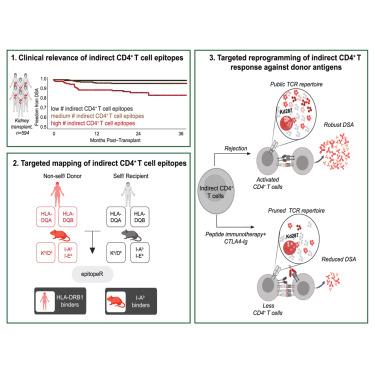Identification of indirect CD4+ T cell epitopes associated with transplant rejection provides a target for donor-specific tolerance induction
IF 25.5
1区 医学
Q1 IMMUNOLOGY
引用次数: 0
Abstract
Antibodies against the donor human leukocyte antigen (HLA) molecules drive late transplant failure, with HLA-DQ donor-specific antibodies (DSAs) posing the highest rejection risk. Here, we investigated the role of indirect CD4+ T cell epitopes—donor-derived peptides presented by recipient major histocompatibility complex (MHC) class II—in DSA formation. Antigen mapping of samples from HLA-DQ DSA-positive kidney and heart transplant recipients revealed two polymorphic hotspots in donor HLA-DQ that generated alloreactive peptides. Antigen mapping of indirect CD4+ T cell epitopes in a mouse model of fully MHC mismatched skin graft transplantation (BALB/c to C57BL/6) identified a similar epitope (amino acids 287–301) derived from the donor H2-Kd. Tetramer-binding Kd287+ CD4+ T cells were detected during rejection and their transfer into T cell-deficient mice induced DSA. Systemic delivery of high-dose donor H2-Kd peptides combined with CTLA4-Ig reduced the frequencies of Kd287+ CD4+ T cells and DSA formation. Thus, targeting a narrow range of donor antigens may prevent DSA formation and improve transplant outcomes.

鉴定与移植排斥相关的间接CD4+ T细胞表位为诱导供体特异性耐受提供了靶标
针对供体人类白细胞抗原(HLA)分子的抗体驱动移植晚期失败,HLA- dq供体特异性抗体(dsa)具有最高的排斥风险。在这里,我们研究了间接CD4+ T细胞表位-受体主要组织相容性复合体(MHC) ii类呈递的供体衍生肽-在DSA形成中的作用。来自dsa阳性肾和心脏移植受者的HLA-DQ样本的抗原定位显示,供者HLA-DQ中有两个产生同种异体反应肽的多态性热点。在完全MHC错配皮肤移植小鼠模型(BALB/c至C57BL/6)中,间接CD4+ T细胞表位的抗原定位鉴定出来自供体H2-Kd的类似表位(氨基酸287-301)。在排斥反应中检测到四聚体结合Kd287+ CD4+ T细胞,并将其转移到T细胞缺陷小鼠中诱导DSA。大剂量供体H2-Kd肽联合CTLA4-Ig的全身递送降低了Kd287+ CD4+ T细胞的频率和DSA的形成。因此,靶向狭窄范围的供体抗原可能阻止DSA的形成并改善移植结果。
本文章由计算机程序翻译,如有差异,请以英文原文为准。
求助全文
约1分钟内获得全文
求助全文
来源期刊

Immunity
医学-免疫学
CiteScore
49.40
自引率
2.20%
发文量
205
审稿时长
6 months
期刊介绍:
Immunity is a publication that focuses on publishing significant advancements in research related to immunology. We encourage the submission of studies that offer groundbreaking immunological discoveries, whether at the molecular, cellular, or whole organism level. Topics of interest encompass a wide range, such as cancer, infectious diseases, neuroimmunology, autoimmune diseases, allergies, mucosal immunity, metabolic diseases, and homeostasis.
 求助内容:
求助内容: 应助结果提醒方式:
应助结果提醒方式:


